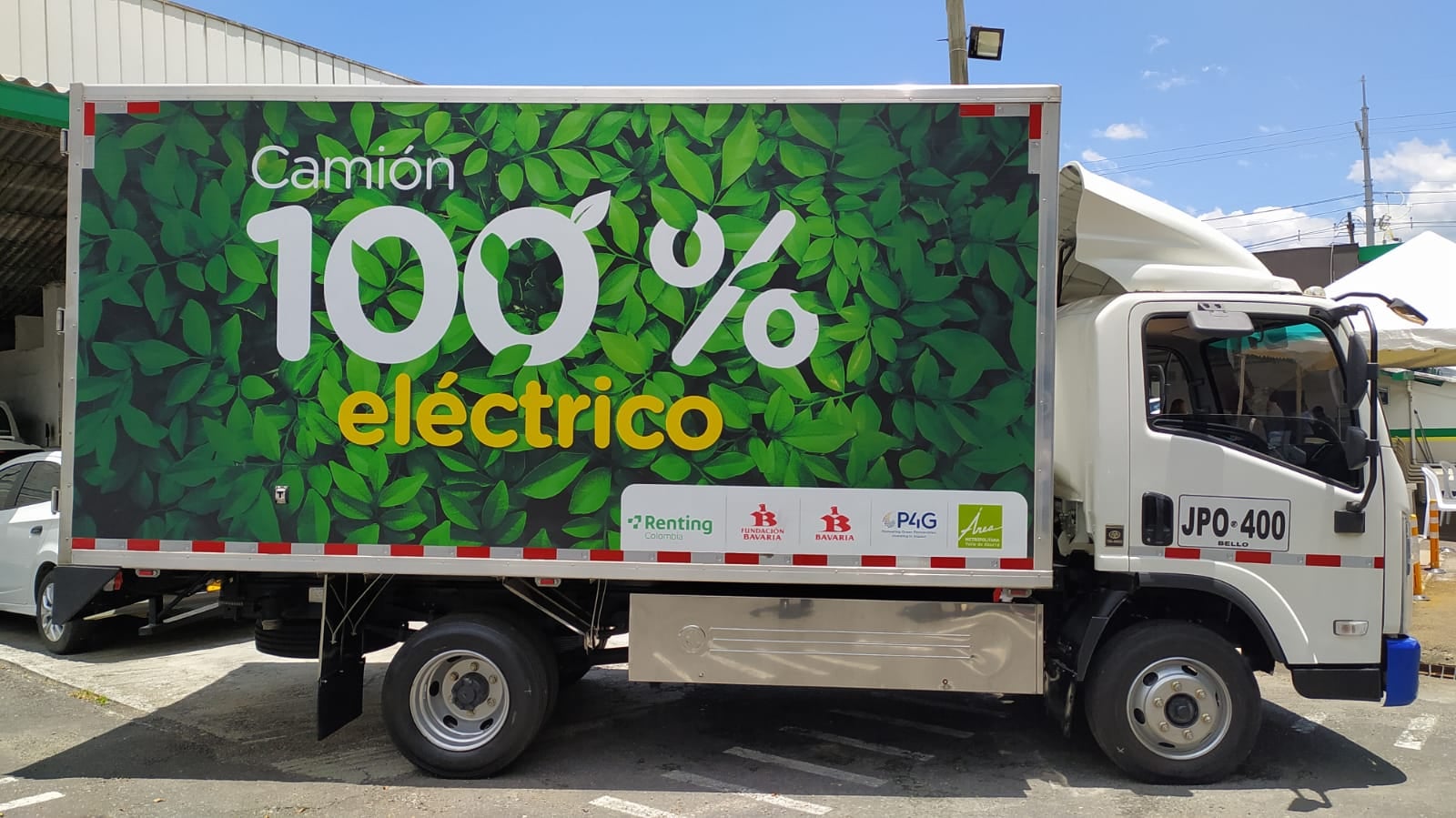How a P4G Partnership is Accelerating E-mobility in Colombia

Subject
P4G Partnerships
Country
Publication Date
2021-10-07
About
“Community is what unites us, and this is what P4G enables,” Carlos Serrano, Leader of Sustainable Mobility for Renting Colombia, remarked at an event for P4G’s Sustainable Mobility in Cargo Transportation Partnership in Colombia. The event highlighted the partnership’s impact in expanding electric mobility in Colombia to shift the cargo logistics sector towards greater sustainability. The partnership has advanced its aims to build more sustainable cities and improve the quality of life for Colombians.
Diana Valencia, Director of Procurement for Bavaria, Colombia’s leading beverage company, shared the company’s goals of buying 100% of energy from renewable sources by 2025, while reducing emissions by 25% throughout their fleets by 2030. These goals, which align with the Colombian government’s national priorities, connected them to conversations with the Colombia Department of National Planning (DNP) and Renting Colombia to work on the proposal for a P4G partnership in 2019.
After conversations facilitated by First Lady of Colombia Maria Juliana Ruiz Sandoval, partners including Renting Colombia recognized P4G, with its systematic emobility portfolio and engaged Colombian national platform, as the perfect partner for a sustainable transportation project, shared Ana Maria Echeverry Merizalde, Commercial Vice President of Renting Colombia. Wanting to lead the market in sustainability, Renting Colombia set a goal of 1,000 vehicles powered by renewable energy, which they will reach in a few months.
For the scope of the P4G partnership, the partners set out three objectives of impact, including rolling out 200 electric trucks across Colombia; creating a learning environment to share efficiencies with other Colombian companies; and ensuring those with limited access, such as small businesses, would be included in the sustainable mobility ecosystem. This focus on making the business case for an interconnected system, where emissions affect everyone, helped the partnership be more successful in the end. “We need everyone to make the right decision so we can have this transformation,” Echeverry Merizalde said.
Alicia Lozano, Sustainability Manager at Bavaria, also emphasized the importance of cooperation for making the electric trucks ecosystem viable. She noted that P4G’s catalytic grant funding helped reduce the risk to implement pilot projects and document lessons learned around logistics and financing that demonstrated the model’s efficacy, thereby convincing other companies to adopt electric trucks. Lozano emphasized that although this transition is challenging, it is viable, which is why creating this platform for small and medium enterprises to proceed with more security is essential.
Shifting to specifics about the electric fleets the partnership rolled out, Carlos Serrano highlighted how they have worked to make the trucks more attractive to incentivize greater adoption. In their course, “Fund for Electric Trucks,” 27 companies participated, of which 20 piloted trucks that made deliveries across 58,000 kilometers in 4 months. With zero emissions from the vehicles, this project helped avoid 36.7 tons of Co2 emissions.
The event also featured the perspective of one of the companies in Colombia who participated in the electric truck pilot to demonstrate how sustainable transportation is attractive across sectors. Carolina Restrepo, Sustainability Project Coordinator at Expocafé, a coffee exporter, shared how their commitment to coffee sustainability has led them to pursue low-carbon transportation to complement sustainable farming practices.
Bringing in the government perspective, Jonathan Bernal, Director of Infrastructure and Sustainable Energy at DNP shared Colombia’s three principal public policy priorities, including energy efficiency, air quality and public health, and greenhouse gas emissions. The government has enacted several plans and policies to make logistics more competitive and efficient as they expand fleets of cleaner vehicles. The 2019 Cargo transport policy has set the goal of rolling out 2,000 zero emissions heavy vehicles in the next 15 years, an objective that the partnership has contributed to. Bernal thanked P4G for supporting this leading initiative aligned with Colombia’s objectives, stating “P4G shows us these interesting strategies along with the Bavaria partnership, and they’ve helped us think about establishing a fund for zero emissions fleets.”
To close the event, Daniel Mejia, P4G’s Regional Manager for Latin America, highlighted the partnership’s success in dismantling perceived barriers to electric mobility in Colombia and delivering electric vehicles across the country. Mejia also shared how the partnership fits into P4G’s broader portfolio on electric mobility and its work with the Colombian government to deliver significant impact ahead of the next P4G Summit, to be hosted by Colombia in 2023. “Working with passionate implementers such as Renting Colombia and Bavaria, it is clear that Colombia has significant potential to achieve transformative impact through domestically-driven solutions,” Mejia said.
Watch the full event (in Spanish) here.
